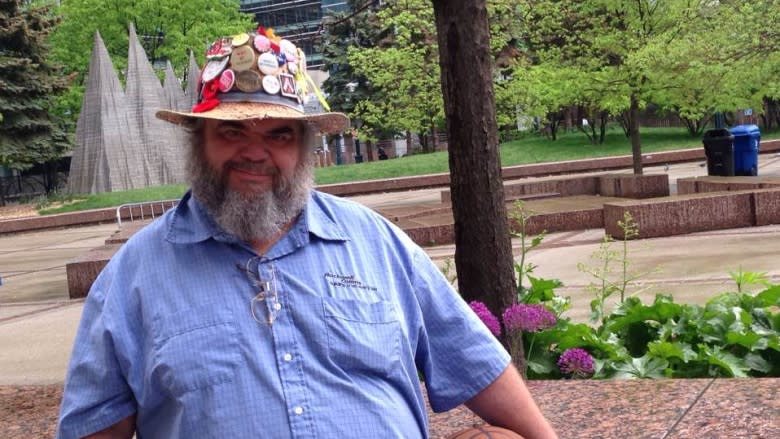Veteran hall monitor in the 'mushy middle' on whether cops should be in school
Dave Bradley has stood sentinel in Toronto's schools for the past 26 years, a basketball settled in the crook of his arm, his head held high despite the dozens of buttons weighing down his hat.
He goes by Dave and sometimes Bradley, but never with a "Mister" before it. And don't bother trying to call him sir.
Bradley has been a hall monitor for more than two decades, now working at Earl Haig Secondary School.
Hall monitors are employed by school boards to watch over the school campus outside of the classroom. They frequently wind up working in schools alongside police officers who are part of the School Resource Officer program.
"When I was young — being terribly shy — going to anybody, especially an adult, to ask for help was not possible. I would have to summon every ounce of courage, and I usually wouldn't," he said. "So every time that a kid comes to me or I go to them I see it as a potentially bridge-building opportunity."
Pulling police from schools
Bradley says the police officers he's worked with have had much the same outlook.
The Toronto Police Services Board is considering pulling the 36 officers spread throughout the school system — and Bradley says he's in the "mushy middle," explaining that he can see both sides of the argument.
The board has agreed to review the School Resource Officer program because some students have said they've felt threatened by having armed police officers in school.
Others have said that officers can stigmatize either a school or a neighbourhood.
Writer Desmond Cole, a vocal critic of the program, has said that it affects marginalized students.
"It has targeted black kids, Indigenous kids. It's targeted kids with disabilities," he said earlier this month. "It's targeted kids without immigration status who are afraid to even walk through the halls because they don't want to have a confrontation with a police officer."
Bradley said that he understands those concerns, recalling a time when many immigrant students did not to come to class following the announcement that police would be visiting the next day.
"In many countries, police are not our friends," he said Monday. But he said that he's personally never witnessed any threatening behaviour from the police officers he's worked with.
"It didn't take long until he became part of… the fabric of the school," Bradley said of the first officer with whom he worked. "Sometimes he was uniformed, sometimes he was not. He got involved in a variety of things."
Gaining trust
It's a matter of gaining trust, he said, something that he said he thinks happens when an officer stays at one school for many years. Bradley has done the same thing, having spent the last 15 years at Earl Haig Secondary School.
He notes that many hall monitors are actually retired police officers.
Over the years, he's added his students on Facebook, through which he's been able to connect with some dealing with depression and help them get counselling.
"If we don't have a lot of trouble, like a fireman who doesn't have any fires to put out, we go and prevent them," he said of his work. "And I found the [police] did pretty much the same."



